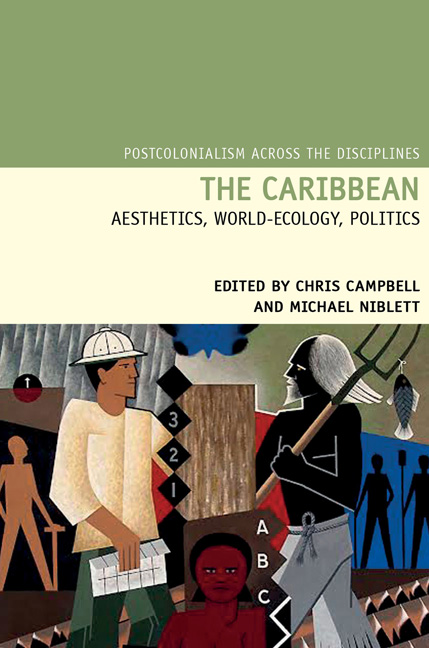Book contents
- Frontmatter
- Contents
- Acknowledgements
- Introduction: Critical Environments: World-Ecology, World Literature, and the Caribbean
- Prologue: The Brutalization of Truth
- Catastrophes and Commodity Frontiers
- Ecological Revolutions and the Nature of Knowledge
- Economies of Extraction: Restructuring and Resistance
- 7 Ecopoetics of Pleasure and Power in Oonya Kempadoo's Tide Running
- 8 Jamaica and the Beast: Negril and the Tourist Landscape
- 9 Ecology, Identity, and Colonialism in Martinique: The Discourse of an Environmental NGO (1980–2011)
- Epilogue: Tingaling
- Notes on Contributors
- Index
7 - Ecopoetics of Pleasure and Power in Oonya Kempadoo's Tide Running
from Economies of Extraction: Restructuring and Resistance
- Frontmatter
- Contents
- Acknowledgements
- Introduction: Critical Environments: World-Ecology, World Literature, and the Caribbean
- Prologue: The Brutalization of Truth
- Catastrophes and Commodity Frontiers
- Ecological Revolutions and the Nature of Knowledge
- Economies of Extraction: Restructuring and Resistance
- 7 Ecopoetics of Pleasure and Power in Oonya Kempadoo's Tide Running
- 8 Jamaica and the Beast: Negril and the Tourist Landscape
- 9 Ecology, Identity, and Colonialism in Martinique: The Discourse of an Environmental NGO (1980–2011)
- Epilogue: Tingaling
- Notes on Contributors
- Index
Summary
One does not have to look far to find historical and contemporary representations of the Caribbean as an erogenous zone, a tropical space of lasciviousness, a sensual paradise of sun, sea, and sex. Since the days of colonization, both the natural world and Caribbean people have been eroticized and sexualized, especially for European and North American viewers and consumers. In Consuming the Caribbean, Mimi Sheller unpacks these prevalent discourses, situating them historically and discussing their present-day iterations. Interpreting a British Airways magazine – which describes the Caribbean as a Garden of Eden, but ‘after Eve tempted Adam with the apple’ – Sheller writes:
Thus the new Eden is a perpetual garden in which sexuality can run rampant; rather than being expelled from the garden, humanity can indulge all the temptations of fertile nature and fertile sex, without guilt. Vandal-proof nature serves as a transparent metonym for sexual access to the ‘natives’ without consequence; the laws of nature and of morality have both apparently been temporarily suspended in this fantasy Jamaica, more vested in Hedonism than in Edenism. (Sheller, 2003, 69)
Sheller describes this ‘view’ of Caribbean bodies as ‘part of the scenery of tropical landscapes’ which involves ‘various kinds of animalization and objectification’ (157). She cites Sánchez-Taylor who has shown that ‘sex tourism packages Caribbean people as “embodied commodities” by turning the long history of sexual exploitation of women (and men) under colonial rule into a “lived colonial fantasy” available for the mass tourist consumer’ (164).
Authors and critics have negotiated the perceived burden of representing Caribbean sexuality in various ways. Charting representations of sex and sexuality in Caribbean literature, Rosamond King offers the following periodization: literature (usually authored by men) of sexual abuse by those in power, written in the 1930s; representations of women in men's novels as primarily sexual partners (often extramarital, non-monogamous, and interracial) in the 1950s to the 1970s; and novels by men and women that portray ‘women's sexual maturation, women's sexuality, and women's and men's homosexuality’ in the 1980s (2002, 27). King suggests that critical silences on these topics may reflect scholars who are ‘wary of re-inscribing myths and stereotypes’ (35) about Caribbean sexuality, but that without these analyses it is more difficult to challenge and deconstruct such discourses (36).
- Type
- Chapter
- Information
- The CaribbeanAesthetics, World-Ecology, Politics, pp. 145 - 160Publisher: Liverpool University PressPrint publication year: 2016



